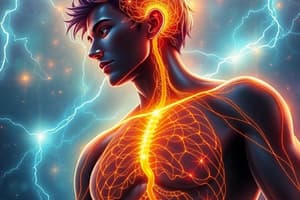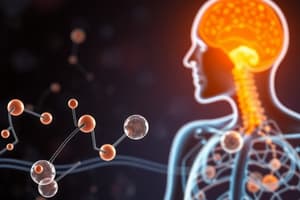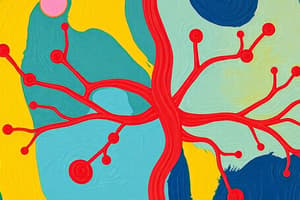Podcast
Questions and Answers
What does DIGIN stand for?
What does DIGIN stand for?
- Intestinal permeability (correct)
- Digestion (correct)
- Enteric Nervous System (correct)
- Gastrointestinal Flora (correct)
- Immune regulation (correct)
What is the function of cortisol?
What is the function of cortisol?
Stimulates liver to convert amino acids to glucose, mobilizes fatty acids, increases coagulation, suppresses part of immune response.
Prolonged cortisol can lead to __________ __________.
Prolonged cortisol can lead to __________ __________.
Fat deposits
Which hormones are involved in the Sterogenic Pathway?
Which hormones are involved in the Sterogenic Pathway?
What are key functions of DHEA?
What are key functions of DHEA?
What symptoms are associated with adrenal depletion?
What symptoms are associated with adrenal depletion?
Symptoms of too much adrenaline include __________ and __________.
Symptoms of too much adrenaline include __________ and __________.
What is cortisol steal?
What is cortisol steal?
What is associated with gluten sensitivity in thyroid disease?
What is associated with gluten sensitivity in thyroid disease?
What are factors that inhibit thyroid hormone?
What are factors that inhibit thyroid hormone?
What nutrients are critical for ATP synthesis via the electron transport pathway?
What nutrients are critical for ATP synthesis via the electron transport pathway?
What symptoms can occur due to zinc deficiency?
What symptoms can occur due to zinc deficiency?
Excess iron can cause DNA damage.
Excess iron can cause DNA damage.
Which of the following symptoms are signs of inflammation?
Which of the following symptoms are signs of inflammation?
Study Notes
DIGIN Framework
- D-Digestion, I-Intestinal permeability, G-Gastrointestinal Flora, I-Immune regulation, E-Enteric Nervous System
Cortisol Functions
- Stimulates liver to convert amino acids to glucose
- Increases glucagon in the liver
- Mobilizes fatty acids in blood
- Enhances coagulation
- Suppresses parts of the immune response
Prolonged Cortisol Effects
- Promotes fat deposits and increases blood pressure
- Increases protein breakdown and bone demineralization
- Leads to immune suppression, memory loss, depression, and elevated blood sugar levels
Sterogenic Pathway
- Cholesterol (CHL) ➔ Pregnenolone ➔ 17-OH Pregnenolone ➔ Progesterone ➔ 11-Deoxyprogesterone
DHEA Functions
- Precursor for testosterone and estrogen
- Reverses immunosuppression from excessive cortisol
- Stimulates bone remodeling and lowers cholesterol levels
- Enhances muscle mass and aids in T4 to T3 conversion
- Accelerates recovery from acute stress
General Adaptation Syndrome Stages
- Stage 1: Asymptomatic arousal with increased cortisol and DHEA
- Stage 2: Chronic stress with elevated cortisol and decreased DHEA, leading to stress-related symptoms
- Stage 3: Adrenal depletion with decreased cortisol and DHEA, resulting in fatigue and depression
Adrenal Dysfunction Symptoms
- Fatigue, memory loss, over-reaction to stress, and high adrenaline symptoms
Adrenaline Symptoms
- High levels: weight loss, anxiety, palpitations, hypertension, glucose fluctuations
- Low levels: orthostatic hypotension, lack of focus, non-restful sleep
Cortisol Steal Concept
- Increased cortisol may inhibit production and activity of sex hormones (progesterone, estrogen, DHEA, testosterone)
HPA Axis Conditions
- Conditions associated with elevated cortisol: chronic diseases, melancholic depression, panic disorders
- Conditions associated with depressed HPA axis: atypical depression, PTSD, fibromyalgia
Thyroid Function and Stress
- Hypothalamic release of TRH stimulates TSH from the pituitary gland, leading to thyroid hormone production
Thyroid Dysfunction Factors
- Influenced by stress, inflammation, dietary factors, gluten sensitivity, and metals
Key Nutrients for Thyroid Health
- Zinc, selenium, iron, iodine, vitamins D and A are essential for thyroid regulation
Medication Interference with T4-T3 Conversion
- Common medications hindering conversion include beta-blockers, estrogen replacements, and lithium
Oxidative Stress and Energy Production
- Necessary for energy production but excessive oxidative stress can harm the body
- Key nutrients for ATP synthesis: riboflavin (B2) and niacin (B3)
Protective Measures Against Oxidative Damage
- Antioxidants, such as vitamin C, E, and alpha-lipoic acid, help inhibit inflammation and oxidative damage.
General Adaptation Syndrome Overview
- Symptoms develop through three stages: arousal, adaptation, and exhaustion, corresponding to cortisol and DHEA levels
Chelation and Detoxification Strategies
- 5 R program: Remove, Replace, Re-inoculate, Repair, and Rebalance
Neurodegenerative Disease Markers
- Cystine to cysteine ratio and oxidative damage indicated by 8-hydroxy-deoxyguanosine levels
Mitochondria Health
- Key in energy production and hormone synthesis, with dysfunction primarily affecting the brain and skeletal muscle
Arsenic Exposure Risks
- Commonly found in meat, fish, wine, water, and rice; early signs may include neuropathy
Meditation Benefits
- Proven to increase serotonin levels in the central nervous system
Summary of Inflammatory Signs
- Presence of tumor, rubor (redness), calor (heat), dolor (pain), and loss of function.
Manganese Toxicity
- Linked to Parkinson-like symptoms, including tremors, irritability, and mood changes
Studying That Suits You
Use AI to generate personalized quizzes and flashcards to suit your learning preferences.
Description
Test your knowledge on the DIGIN framework related to digestion, intestinal permeability, and how cortisol affects the body. This quiz covers the functions of cortisol, its prolonged effects, and the steroidogenic pathway. Challenge yourself and see how well you understand these critical concepts in physiology.




